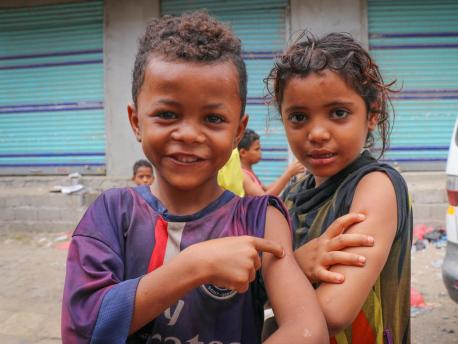
Vaccines Save Lives
Measles was declared eliminated in the United States in 2000. Now it's back and on the rise, fueled by vaccine hesitancy and a lack of awareness of just how deadly it can be.
UNICEF and partners are working tirelessly all over the world to save and protect children.
Measles is highly contagious — more than Ebola, tuberculosis or influenza — and potentially deadly. But thanks to a highly effective vaccination program, measles was declared eliminated in the U.S. in 2000.
Unfortunately, that's not the end of the story.
As of March 28, 387 cases of measles have been reported this year in the U.S., according to the Centers for Disease Control and Prevention (CDC). In 2019, measles cases have been reported in 15 states: Arizona, California, Colorado, Connecticut, Georgia, Illinois, Kentucky, Michigan, Missouri, New Hampshire, New Jersey, New York, Oregon, Texas and Washington.
Why is measles — a highly contagious, vaccine-preventable respiratory illness — on the rise in the U.S.?
Public health experts blame complacency and the antivaxxer movement for this alarming increase. Most people who get measles are unvaccinated. Outbreaks in the U.S. typically start when travelers contract measles abroad and then bring it home. If they happen to live in a community of unvaccinated people, the disease spreads even more rapidly. According to the CDC, up to 90 percent of nonimmunized people who are exposed to the virus will become infected.
The latest outbreaks have been fueled by the antivaccine movement and a lack of awareness about just how deadly measles can be
Parents who opt out of immunizing their children are putting their health — and possibly their lives — at risk. Before the measles vaccine became available in 1963, between 3 and 4 million people were infected with measles in the U.S. each year. An estimated 400 to 500 people died, 48,000 were hospitalized and 1,000 suffered encephalitis (swelling of the brain).
Vaccines protect children from dangerous infectious diseases
Vaccines have an excellent safety record and most "vaccine scares" have proven to be false alarms. Immunization is one of the most cost-effective public health interventions to date, preventing an estimated 2 to 3 million deaths every year.
"Almost all of these measles cases are preventable, and yet children are getting infected even in places where there is simply no excuse," said UNICEF Executive Director Henrietta Fore. "Measles may be the disease, but, all too often, the real infection is misinformation, mistrust and complacency. We must do more to accurately inform every parent, to help us safely vaccinate every child."
Top photo: Children in Aden, Yemen proudly show off the spots on their arms where they were vaccinated during a mobile Measles and Rubella vaccination campaign backed by UNICEF in February 2019. © UNICEF/UN0284429/Fadhel
HOW TO HELP
There are many ways to make a difference
War, famine, poverty, natural disasters — threats to the world's children keep coming. But UNICEF won't stop working to keep children healthy and safe.
UNICEF works in over 190 countries and territories — more places than any other children's organization. UNICEF has the world's largest humanitarian warehouse and, when disaster strikes, can get supplies almost anywhere within 72 hours. Constantly innovating, always advocating for a better world for children, UNICEF works to ensure that every child can grow up healthy, educated, protected and respected.
Would you like to help give all children the opportunity to reach their full potential? There are many ways to get involved.





